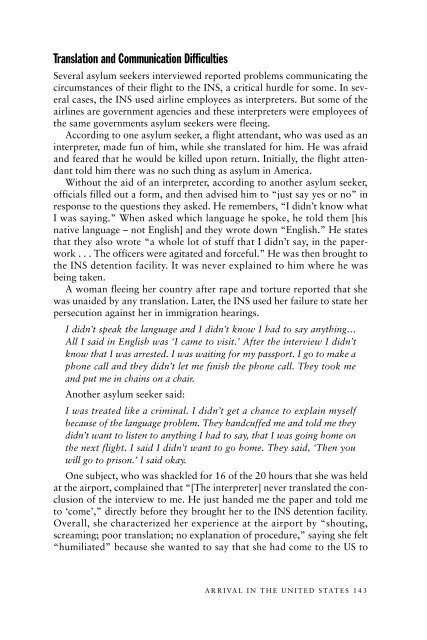From Persecution to Prison - Bellevue/NYU Program for Survivors of ...
From Persecution to Prison - Bellevue/NYU Program for Survivors of ...
From Persecution to Prison - Bellevue/NYU Program for Survivors of ...
You also want an ePaper? Increase the reach of your titles
YUMPU automatically turns print PDFs into web optimized ePapers that Google loves.
Translation and Communication DifficultiesSeveral asylum seekers interviewed reported problems communicating thecircumstances <strong>of</strong> their flight <strong>to</strong> the INS, a critical hurdle <strong>for</strong> some. In severalcases, the INS used airline employees as interpreters. But some <strong>of</strong> theairlines are government agencies and these interpreters were employees <strong>of</strong>the same governments asylum seekers were fleeing.According <strong>to</strong> one asylum seeker, a flight attendant, who was used as aninterpreter, made fun <strong>of</strong> him, while she translated <strong>for</strong> him. He was afraidand feared that he would be killed upon return. Initially, the flight attendant<strong>to</strong>ld him there was no such thing as asylum in America.Without the aid <strong>of</strong> an interpreter, according <strong>to</strong> another asylum seeker,<strong>of</strong>ficials filled out a <strong>for</strong>m, and then advised him <strong>to</strong> “just say yes or no” inresponse <strong>to</strong> the questions they asked. He remembers, “I didn’t know whatI was saying.” When asked which language he spoke, he <strong>to</strong>ld them [hisnative language – not English] and they wrote down “English.” He statesthat they also wrote “a whole lot <strong>of</strong> stuff that I didn’t say, in the paperwork. . . The <strong>of</strong>ficers were agitated and <strong>for</strong>ceful.” He was then brought <strong>to</strong>the INS detention facility. It was never explained <strong>to</strong> him where he wasbeing taken.A woman fleeing her country after rape and <strong>to</strong>rture reported that shewas unaided by any translation. Later, the INS used her failure <strong>to</strong> state herpersecution against her in immigration hearings.I didn’t speak the language and I didn’t know I had <strong>to</strong> say anything…All I said in English was ‘I came <strong>to</strong> visit.’ After the interview I didn’tknow that I was arrested. I was waiting <strong>for</strong> my passport. I go <strong>to</strong> make aphone call and they didn’t let me finish the phone call. They <strong>to</strong>ok meand put me in chains on a chair.Another asylum seeker said:I was treated like a criminal. I didn’t get a chance <strong>to</strong> explain myselfbecause <strong>of</strong> the language problem. They handcuffed me and <strong>to</strong>ld me theydidn’t want <strong>to</strong> listen <strong>to</strong> anything I had <strong>to</strong> say, that I was going home onthe next flight. I said I didn’t want <strong>to</strong> go home. They said, ‘Then youwill go <strong>to</strong> prison.’ I said okay.One subject, who was shackled <strong>for</strong> 16 <strong>of</strong> the 20 hours that she was heldat the airport, complained that “[The interpreter] never translated the conclusion<strong>of</strong> the interview <strong>to</strong> me. He just handed me the paper and <strong>to</strong>ld me<strong>to</strong> ‘come’,” directly be<strong>for</strong>e they brought her <strong>to</strong> the INS detention facility.Overall, she characterized her experience at the airport by “shouting,screaming; poor translation; no explanation <strong>of</strong> procedure,” saying she felt“humiliated” because she wanted <strong>to</strong> say that she had come <strong>to</strong> the US <strong>to</strong>ARRIVAL IN THE UNITED STATES 143



